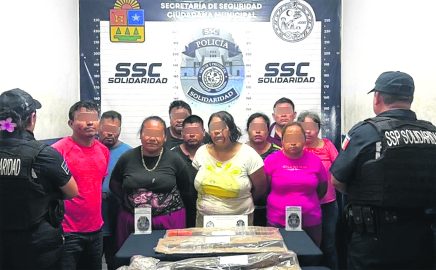Municipal Police in Playa del Carmen have arrested 10 individuals, consisting of five men and five women, for allegedly invading land near the Bali subdivision. The operation was prompted by local residents reporting the presence of an armed group in the area.
The incident occurred near the invasion known as “Las Torres.” Residents reported that the group entered the property illegally and threatened a man who tried to inform them that the land was private. When authorities arrived, they found the suspects on a dirt road and arrested them due to their aggressive behavior.
Several items were confiscated during the arrest, including three machetes, a knife, a hammer, stones, and a wooden log. The detainees hail from various states such as Tabasco, Oaxaca, Yucatán, and Chiapas.
The arrested individuals include:
– Francisco “N” (36 years old) and Clara Luz “N” (37 years old) from Tabasco
– Luis “N” (48 years old) from Oaxaca
– Ricardo “N” (53 years old) from Yucatán
– Six individuals from Chiapas: Yolanda “N” (40 years old), Jaime “N” (52 years old), Victor “N” (45 years old), Bertha “N” (46 years old), Eliana “N” (45 years old), and Angela “N” (34 years old)
All those arrested were handed over to the State Attorney General’s Office (FGE) for the necessary legal proceedings.
This incident highlights the increasing problem of land invasions in the region, a situation that concerns both residents and local authorities. The authorities have reiterated their commitment to taking the necessary actions to ensure security and respect for private property in Playa del Carmen.
In recent years, Quintana Roo has faced a significant rise in land invasions and the proliferation of irregular settlements, particularly in tourist municipalities such as Cancún, Tulum, Solidaridad, Puerto Morelos, Isla Mujeres, and Benito Juárez. This phenomenon has led to social and environmental concerns, affecting the quality of life of residents and the ecological balance of the region.
Historically, land invasion has been used as an electoral strategy, where rulers promise to regularize the land in exchange for votes. However, this practice has resulted in numerous irregular colonies lacking basic services like drinking water, sanitary drainage, and electricity. Recent data shows that around 60,000 families in Cancún lived in these conditions last year.
The lack of basic services in these irregular settlements has caused public health issues, such as diarrheal diseases, allergies, and skin conditions. Additionally, groundwater contamination and deforestation have negatively impacted the environment, with contaminated cenotes and an increased risk of natural disasters due to construction in flood-prone areas.
Local authorities have attempted to tackle the issue through land tenure regularization programs and collaboration with civil organizations. However, resource shortages and corruption have hindered efforts to effectively resolve the problem.
Source: Diario Imagen




